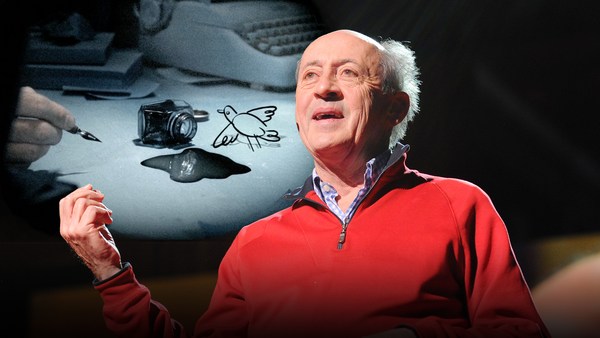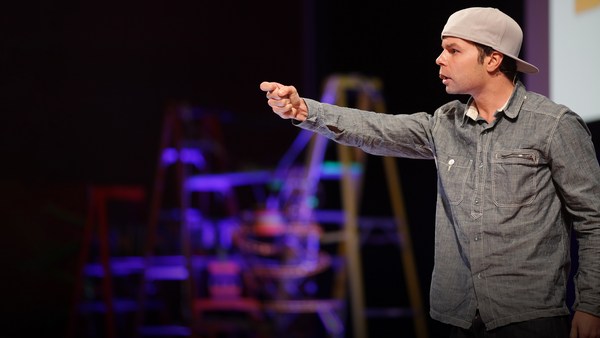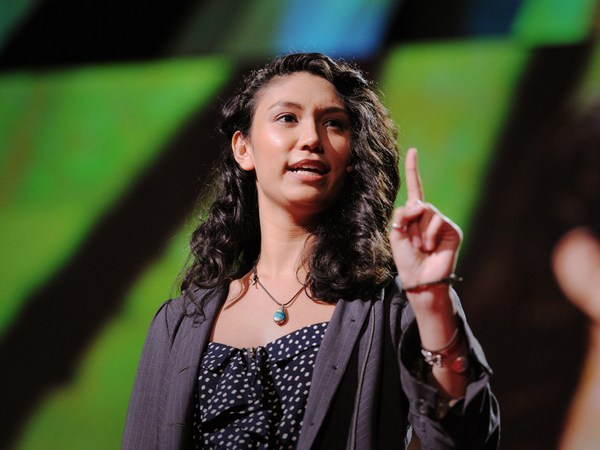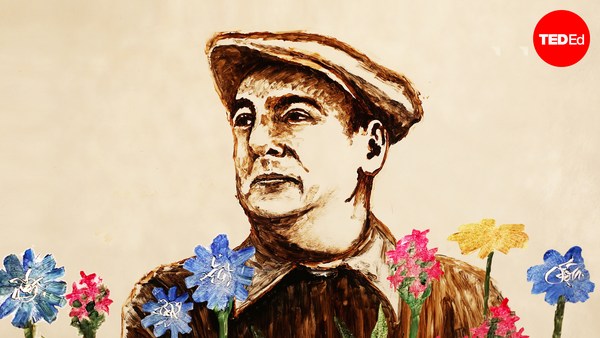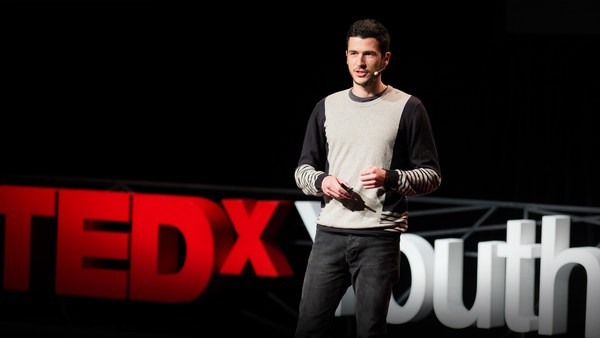(Music) So whenever I tell people that I'm a spoken word poet, the most common response I get is “Oh”. And to be completely transparent, it’s not a good type of “Oh”. It’s not the type of “Oh” you say when people tell you good news. it’s more like that type of response you give when your friends suggest you doing something completely uninteresting. Yeah, I know. And believe it or not, I’ve gotten that before in response from multiple people when I tell them what I’ve told them. I told them that I’m a poet and I don’t blame them because there seems to be a general societal perception of poetry being dead and boring. And whether that’s because people automatically associate poetry with dead white male poets or because they don’t seem to be able to relate to the words the poems seem to be saying. However, today I’m here to talk about my experience as a spoken word poet, and hopes of challenging you to reimagine poetry and all other types of literary art as not just dead words on a page, but as living and breathing vessels for social revolution. But before we continue, I'd just like to share some background on myself, because why should you listen to me? My name is Anouk Yeh, and I’m a 17-year-old spoken word poet from Saratoga California. And over the past two years, my work has allowed me to work with organizations such as Planned Parenthood, the International Congress of Youth Voices and Hewlett-Packard. I love poetry because of how dynamic it is, and because how it gives everyone the ability to express themselves unconditionally. But it was it wasn't always this way. Growing up, I never had any special affinity or special attraction to poetry. In middle and elementary school, none of the poems that we read in class really resonated with me. While I did enjoy reading poems about snowy landscapes and read wheelbarrows, it was hard for me to see how most of the poems we read applied to my daily life. And it wasn’t until seventh-grade hit when I had accidentally stumbled upon a playlist of spoken word poems online that I completely fell in love with poetry. And for those of you who don't know, the main difference between spoken word poetry and regular page poetry is the fact that spoken word poems are written to be performed out loud, and sometimes they're performed competitively. Additionally, spoken word poetry in the United States has historically been tied to activism and social justice due to the large influence of it by the Harlem Renaissance. And in these playlists of poems that I found were poems about immigration, women's reproductive rights, and there were poems calling out national politicians for hypocrisy. And for the first time ever, all the poems that I was reading, and listening to felt like they were directly applicable into my own life. And so for a while I was content with just listening to these poems in my room by myself. But this all changed in freshman year when I had gotten into a pretty heated argument with a boy in my biology class over something that had to do with the validity of feminism. I don’t remember the exact contents of our argument, but I do remember going home absolutely fuming and deciding to write a poem about it. And after writing the poem, which was one of the first poems I had actually written in my middle school age, I was still upset about the situation. So in a stew of frustration and sleep deprivation induced self-confidence, I decided to either go big or go home. And I ended up submitting the poem as a performance for the 2019 Women’s March in Oakland. So that January, I ended up performing my poetry out loud for the first time ever in front of a crowd of eight hundred people. And since then I’ve been completely hooked onto spoken word and using it as a means of conveying social justice. So how does something like art relate to social justice, though? Well, my responses, in the words of author Tony Kaid Kembrew, the role of the artist is to make the revolution irresistible. And to me, art and spoken word poetry, specifically, is an especially effective way of advocating for social change because of its accessibility, ability to inspire vulnerability and because of the impact that it can create. So let’s first start off with accessibility. In the summer of 2020, the Black Lives Matter movement was at its peak with cities across the nation hosting protests against police violence weekly. However, in response to the protests, many local governments began setting up curfews and mass arresting protesters, even the peaceful ones. Due to this increased criminalization of physical protesting, many activists turned to art as a form of protest for their own safety. In Seattle, New York and Portland, people sealed off city streets and rededicated them to art. Virtually, any poets held workshops for the general public to express their feelings about systemic injustice. So in this specific case, are allowed these marginalized communities who are bound by respectability politics to keep furthering the revolution, and reimagining a just future without having to directly put their lives on the line. And this isn’t just the case for BLM. Many poets before me have pointed this out. But if you look back through history, whenever there’s an attempt at a tyranny or a dictatorship, the first thing that people in power do is confiscate the community’s books, the community’s poetry and the community’s literature. And I think that’s a big testament to the sociopolitical power that words and art carry, because as small and materially insignificant as they seem, words and art contain the ingredients for a revolution, because art moves people, and not just emotional. A good example of this is Warsan Shah’s poem “Home”. The poem reads [No one leaves home unless home is the mouth of the of a shark.] [You only run for the border when you see the whole city] [running as well.] This poem was written in 2017 in response to a refugee laws that were being implemented across the globe. Not only does the poem have beautiful imagery, it also became the rallying cry for protesters at the American Mexican border in 2017, a rallying cry for protesters who are fighting for the release of migrant children from detention centers. This poem by Warsan Shire is a prime example of how a good piece of art moves people both intellectually and physically, and also coaxes people into starting conversations and acting on important issues that they might not originally be inclined to discuss. And that brings me to our second point, which is vulnerability, especially in politically polarizing times like these. A lot of people find politics by itself, off-putting and even daunting to tackle. But I’ve seen firsthand that when poetry is used as the vessel to address politics, all of a sudden, people are more inclined to draw up their defenses, be vulnerable and start opening up to the other side. So this almost whimsical trait of unity that poetry has has allowed me to connect with people who harbor radically different perspectives than I do. Poetry has allowed me to take up space and speak in rooms that I normally, as a high school student, would not have ever had been allowed into. For instance, during last spring, Andrew Young published an article in The Washington Post urging Asian Americans to assimilate and show their Asian-American Americanness in ways they’ve never before in response to anti Asian racism. In this op-ed, Yang was essentially telling Asian-Americans to keep their heads down and try to endure the situation as best as possible. And after reading this piece, I felt immensely angry and uneasy. My family members were sharing the pieces among themselves, and a lot of people were talking about how it was weird, how it was one of the Asian-Americans most visible politicians asking Asian-Americans to silently endure racism. And reading the op-ed, I couldn’t help but agree. Reading the piece, I couldn’t stop thinking about my Bay Area Asian-American community about my friends, about my classmates, about my parents and all the people Yang was asking to keep their heads down and just silently endure racism. So in response, I wrote a poem called “On the Back Porch” in response to Andrew Yang as a personal reflection on the situation. Although the poem was originally just a way for me to vent out my frustrations with the situation, the poem ended up getting picked up by Stanford University and incorporated into a full-length documentary with the nationally acclaimed Kronos Quartet. The video ended up garnering tens of thousands of views online and sparked discussions all across social media about what true Americanist means. See, while in real life, I, as a high school student, would never have been able to go head to head or be taken seriously against such a large social figure as Andrew Yang. Through my poetry, my voice was able to be amplified and picked up through an entity as large as Stanford. And while it’s been an honor to be able to speak about national politicians and organizers. And speak about national issues, some of my most powerful experiences have been with poetry in a community level work and working directly with the community on advocacy issues through poetry, and so that leads me to impact. So a while back, I was invited to a local middle school to facilitate a community gun violence prevention poetry workshop. And for context, the community was a majority lot next and historically overpoliced one. And at the beginning of the workshop, I performed a few poems to introduce the students to spoken word. Afterward, I asked the students to share their thoughts about community gun violence as a Segway into the writing prompt. While at first a lot of the students were reluctant to share their experiences, slowly, students began opening up about their experiences with community violence. A lot of the students talked about being trailed by the police when walking home, or hearing stories about how their friend’s older siblings or their neighbors were gunned down by the police. I specifically remember one little girl who had to be no more than 11 or 12 years old who started crying when she was sharing her experience with the police. She spoke about the way she’s been pulled over while walking home from school for what the police community police in their area called a student check-ups multiple times in sixth grade. And she talked about the way she could always feel her heart physically beating in her chest every time a cop car would pass her while her mom and her were driving. And all of these students shared that they were angry and disappointed, and how the system not only failed to protect them and their communities, but also saw them as a threat. And so in response, I decided to alter the workshop and turn it into a communal protest poetry workshop where students could write poems that imagined a safer, less violent future for their communities. And during the course of this workshop, I was able to witness the students slowly finding the words that captured their experience. Students who are originally sitting in the corners, reluctant to even answer any of the Chaykin questions, were sharing lines from their poems. After each share, the students would all comment on how each other’s poems resonated with them. And at the end of the workshop, two students walked up to me and told me that the workshop made their experiences feel seen, and that they wanted to become writers in the future, too. And that’s the revolutionary power of poetry. So when we talk about a revolution, a lot of the times we think external. Sorry. Oh, yeah. When we talk about a revolution, a lot of the times we think external. However, what we tend to miss is the importance of internal change and the importance of an interpersonal revolution. See, that day at the workshop, the two students who walked up to me discovered that they had a way to make other people listen to them, to their stories and to their community. They saw firsthand that poetry allowed them to have a voice. So going back to our original question, why is poetry revolutionary while poetry is revolutionary? Because it gives community who historically don’t have a seat at the table a way to advocate for themselves when wielded correctly. Poetry allows people to disrupt the status quo, to disrupt power dynamics that have historically robbed women and people of color, specifically from self-autonomy. Realistically, however, reading put words in a poem doesn’t really do anything when we’re talking about physical impact words on their own. Don’t free migrant children from border control words and poems on their own. Don’t stop the police from terrorizing marginalized communities Materially, words spoken into the air have no direct value. However, when landed into the right ears and one landed into the ears of community searching for hope in the ears of young people looking for a way to express themselves, words have the power to inspire and empower people into acting. So in the past eight minutes, I talked a lot about protest poetry, and the impacts of protest poetry. But I haven’t yet given an example, so I thought I’d share a protest poem. So this poem is called On the Back Porch in response to Andrew Yang and was the poem I was talking about earlier that I had written in response to Yang’s op-ed article. And so now I will be sharing the poem. So [on the Back Porch: In response to Andrew Young]’s op-ed on the pandemic after Samuel Getachew. Quote: We Asian Americans needed to show, embrace and embrace our Americanness in ways we’ve never before. We should show that we are without a shadow of doubt Americans who will do our part for our country in this time of need. And quote Andrew Yang: This is how it starts. We are propelled by the flame blooming in the underbelly of our security, blown over from a land of white rice and honey, where patience is all 10 of the commandments on the tablet. When we arrive, they tell us their Moses doesn’t recognize us. So we sit hopeful and cramped back alleyways, embracing our Americanness in ways we've never before, driving off corner scraps and hand me downs, sitting at the back porch, waiting for them to finally call us into the house, waiting for them to tell us that we are special, we are different, we are the good ones. We sit there in the heat on our haunches, growing fat like ticks off of white lies, and cut passports long swirling with elusive euphemisms until our backs turned scarlet, ringing, rose, blistered hands in anticipation of a godsend or a pat on the head. Isn’t it the same thing on the Back Porch, we say: Please, and thank you, and smile with our best sun smiles on the Back Porch. The wait is long, so we tell stories to pass the time. But sometimes the stories slip out, slither out to meet truth halfway in a language that is of the other land. Dualism, they say, is a mockery of the Back Porch offering we have been given. And in those moments we do what we do best. We lower our heads and repent. We reduce our unraveling to a silhouette of a model minority. And we know better than to complain. When we have secured a spot on the back porch of human amid immigrants, men amid the others, the Back Porch is humid, but we are good at tolerating it, swallowing the heat like a memoir. We pride ourselves on our hopeful, so we diminish the Back Porch to only a rustic. We name the house a Higher Calling we have not yet earned the halos for. But how euphemistic to believe that the same gatekeepers who locked us out would allow our hands to thump the edges of this shimmering neighborhood. How naive to gorge ourselves on dreams about finding a place in the house for us. Because for us, there was no house for us. They are not waiting for us. They are awake and watching through the window sills, and they smile. They tell us that it is still not enough. They tell us that it is easier for a camel to make it through the eye of a needle than for someone to make it through the Back Porch. Convince us that we don't want it just enough to convince us that the Back Porch has always been our home. Thank you.
